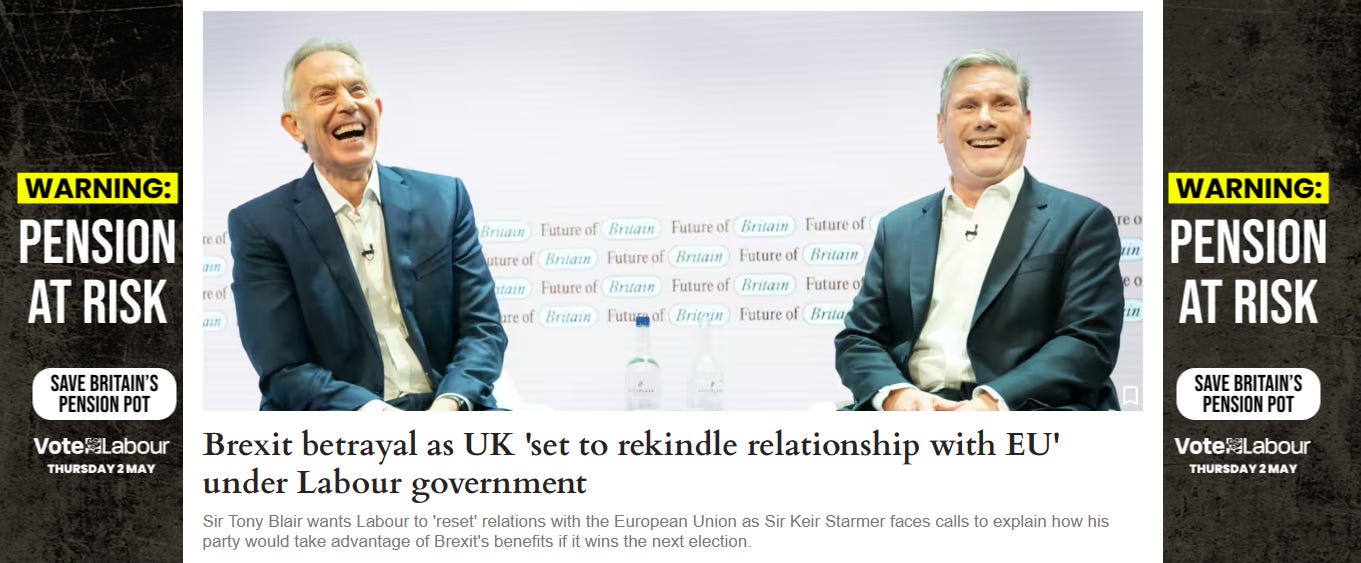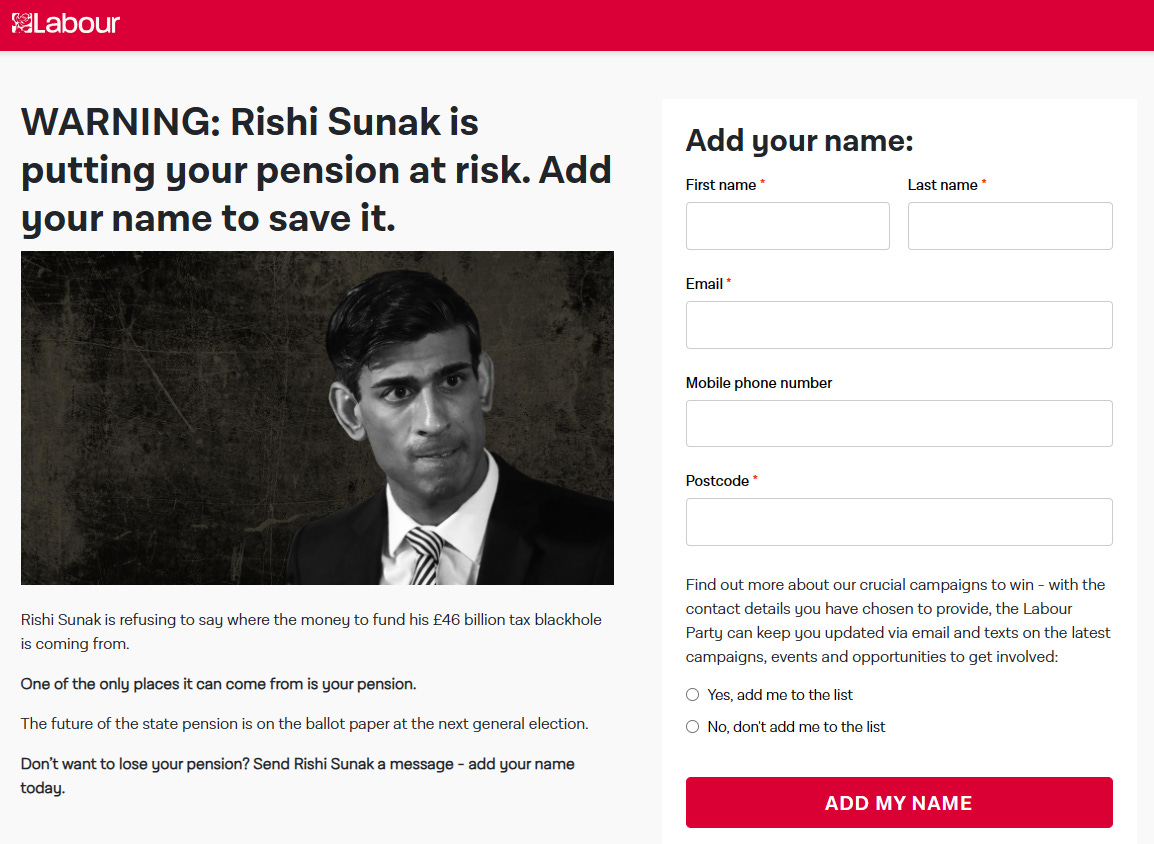Express delivery
It's not enough to put something in the papers. You have to tell the papers you've put something in the papers.
Have you ever sent social media into meltdown? I have. Although I didn’t notice at the time.
One of my side hustles1 is that, as a former Labour adviser, I occasionally get invited on TV or radio to do a bit of political punditry. I have never been under any illusions about my position in the political punditry ecosystem: as a former opposition adviser who wasn’t particularly senior, doesn’t have a newspaper column and was never an MP, let alone a minister, I am a D- or E- or Z-lister, depending on how many levels you want to say the list has (for the avoidance of doubt, people who think I am a D-lister think the list has four levels, people who think I am an E-lister think the list has five levels, and people who think I am a Z-lister think the list has 26 levels, which is an insane thing to think about the granularity of media bookers’ contact lists). But if I’m not busy, and if the topic is something where I think I can say something coherent,2 I don’t mind going on and sometimes even quite enjoy it.
Anyway. I sent social media into “meltdown” with a “shock Corbyn point” which “left Twitter baffled”, as a result of which I was “torn apart” and caused a “Twitterstorm”, and after which “Labour were left humiliated”, when I appeared on Newsnight shortly before the 2019 election, having been asked on to discuss the parties’ preparations for the then-forthcoming TV election debates.3 I thought it went reasonably well, and on the way home I checked Twitter to see if anyone was saying anything about it. They weren’t, to be honest: a few people replied to my own tweet about it, and a few people replied to a clip tweeted by Newsnight, one of whom did so to ask whether I was wearing shoes.4
A few weeks later I discovered this Daily Express story, which had been published on their website the next day:
Now, the reason I found this striking, apart from the fact that it was a story about me in a national news publication, which is inherently striking to me if not to anyone else (I am, for perfectly good reasons, not in the papers very often), was that I spotted this a few weeks after it was published and had not previously noticed it at all. Not only had I not noticed melting down Twitter, I had not noticed a story about me in a national news publication, because nobody else had noticed it either: nobody I know pointed it out to me, either to mock or to sympathise, no former colleagues took the piss, no Tories sought to amplify my - or Labour’s - humiliation, there were no tweets about it, nobody texted, no other media organisations of any kind covered it, nothing.5
This is a very long and roundabout way of getting to the point of this post, which is that nobody I know reads the Daily Express website. So you may not be aware that today the Daily Express website looks like this, complete with a smiling photo of Tony Blair and Keir Starmer:
Although, as it turns out, the smiling photo of Tony Blair and Keir Starmer isn’t on a particularly pro-Labour story. Scroll down, as they say on the internet, for a surprise:
It’s not the Blair and Starmer photo, or the anti-Labour Brexit-focused headline, that’s interesting here. What’s interesting is the banner ad above and surrounding the text: a Labour attack ad, aimed at Express readers, focused on the risk to pensions caused by Rishi Sunak’s as-yet unfunded and untimetabled proposal to scrap National Insurance.
This is something this newsletter has gone on about at some length ever since the Budget:6 however much Tory MPs and Tory voters and voters in general and, quite possibly, you personally would like to see lower taxes, announcing an aspiration to eliminate a tax without saying how that’s going to be paid for opens up a massive space for Labour. And now, here they are, running into it.
Given the relatively elderly readership of the Daily Express, this particular presentation of the attack focuses on pensions, cutting which is one of the ways in which the Tories could choose to pay for the abolition of National Insurance - there are other options, and they might not cut pensions at all, but until they say what their actual plan is this is fair game. And of course, the Daily Express is a Tory newspaper, and its relatively elderly readership is in the section of the population most likely still to be voting Conservative,7 which means that for Labour to go after them can be portrayed as a proper tanks-on-their-lawn move. It’s not just the website: the Express journalist Christian Calgie tweeted this photo of a full-page Labour ad in this weekend’s Sunday Express:
There are two distinct dimensions to this kind of campaign, and both of them are important: doing it, and saying you’re doing it. As I say, lots of people don’t read the Express. Hence Labour’s briefing to The Observer that this is happening, complete with analysis - familiar to regular readers of Dividing Lines - of why it’s happening:
A private focus group run by Labour in the past week convinced its most senior officials that the announcement by Hunt is a huge blunder. Insiders said that “pensioner hero voters” – those who backed the Tories last time but who may switch to Labour – compared the move to Truss’s doomed plan for £45bn in unfunded tax cuts during her brief prime ministership.
Senior Labour figures said it had become an “unexpected bonus” with which to neutralise one of the few Tory strengths. “Their primary concern is that it is a huge unfunded spending commitment,” states an internal memo composed by Labour’s strategy chief, Deborah Mattinson.
“The unfunded commitment raises alarm bells and leads voters to spontaneously make comparisons to Truss’s mini-budget. Beyond this, they recognise the high risk to the future of the state pension – with some worrying it won’t be around for their children/grandchildren. This gives Labour its biggest opportunity with pensioners for some time.”
In fact, the “saying you’re doing it” bit is probably more important than the actual “doing it” bit: there are limits to the number of people who will notice a newspaper ad, and even harder limits to the number of pensioners who will visit the Daily Express website.8 But most of the lobby, who shape the way politics is covered, and therefore the way politics is received by a broader public than just the readers of the Express, will have got the message Labour wants them to get. That message isn’t “your pension could be at risk”, but the much more important “Labour is confident enough to be going after the pensioner vote, and to be taking on the Tories on economic credibility, and it wants the Tories’ unfunded spending plans to be a major election campaign theme and a focus of media attention, and it wants to highlight a Tory strategic blunder and have it covered as such”. Like so much campaigning, it’s a campaign coverage-shaping intervention disguised as a campaign intervention.
Passing along memos that say what your strategy is and how you are executing it is a tried and tested way of making this sort of story work, and the Observer report has two briefed memos in it - not just the Deborah Mattinson quoted in the above extract, but one from Pat McFadden too. These memos are briefed not leaked - nobody is pretending that these memos have reached journalists against the Labour Party’s will - but there’s still a frisson of insider knowledginess in the fact that they are internal memos, and in the fact that they quote private focus groups:
As well as national media and digital ads launched from Sunday, shadow cabinet ministers have been ordered to focus attention on the national insurance abolition pledge. “This is a crucial moment for our local and general election campaigns,” states a memo to the shadow cabinet by Pat McFadden, the veteran MP preparing Labour’s election campaign. “We know from our strategy and insights team that voters share this concern. Scrutinising the Conservatives’ £46bn plan will be a central line of our attack.”
You need to buy the ad space to make people report that you’re buying the ad space. But the value of the ad space is more in the media reports about the ad space than in the people who actually see the ad.
After all, as I discovered a few years ago, if all you do is put something in the Daily Express, nobody will notice.
It is not a side hustle. It’s just that, at the moment I was writing that sentence, it briefly amused me to use the term “side hustle”.
This is not always the case. I am not infrequently asked - usually at very short notice - to go on and talk about things about which I have no knowledge and no interest, and I turn these bids down. The fact that I am tempted to think that this policy reflects well on me reflects badly on me.
See previous footnote: I do know a bit about this, having been closely involved in Labour’s TV election debate prep in 2015, and you can make up your own jokes about how well Labour’s TV election debate prep went in 2015.
I was wearing shoes.
I do realise that “I was in the paper and nobody even texted” is a bit of a self-own about how many friends I have, but I’d like to point out that when this Substack was generously cited by Robert Colvile in two of his Sunday Times columns in recent weeks (one about the Tories’ campaign ads about London, and one about Angela Rayner), I did get messages from people I know saying that they’d seen them. I do have some friends, is what I’m saying. OK, fine, I protest too much.
Bloomberg reported an astonishing poll finding this week: “The age at which Britons are more likely to choose the Tories over the Labour opposition has risen to 70 from 39 at the last general election in 2019”.
If you click on the banner ad, you get taken to this data capture page:
I would be astonished if more than a handful of pensioners fill this in. It’s not for them. It’s for journalists.









Do you know if those Banner ads on the express homepage are universal ads or if the Express just sells personalised ad slots on that page? Cos if it’s personalised while you’re seeing that then the elderly express readers likely aren’t
I have no idea either way to be clear, just curious if you knew